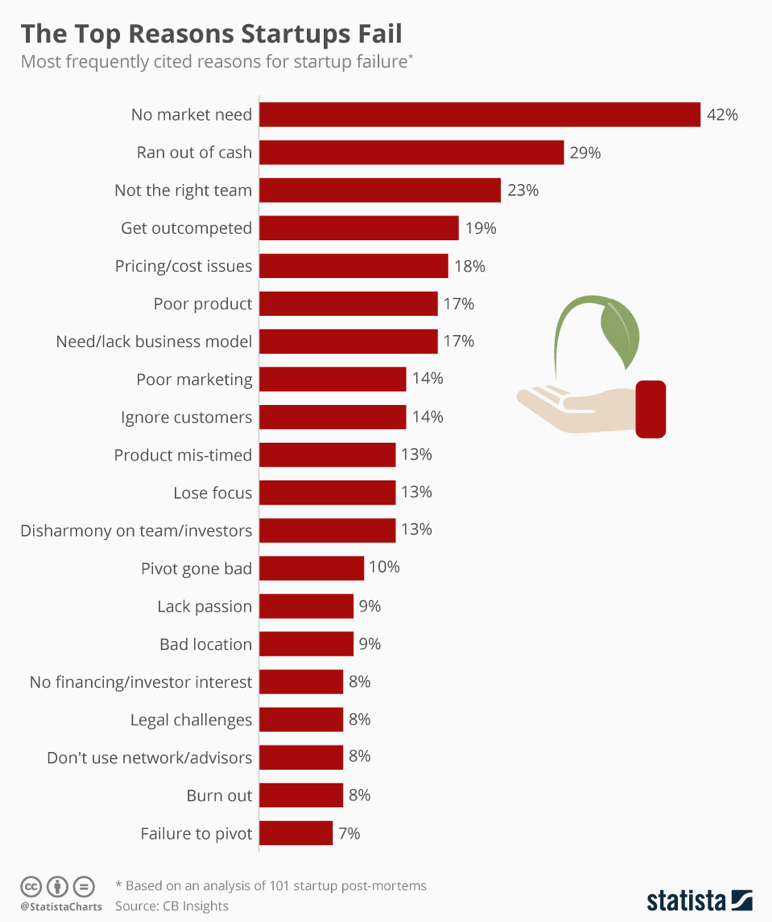

Updated December 19, 2024
Four-fifths of mobile startups fail because of poor planning and development mistakes. In this article, we will cover all the pain points that can help investors avoid mistakes that may lead to the downfall of their business.
Updated 08/31/2022
With more than 4 million apps in the Google Play and Apple App store combined, the market continues to become more crowded. It can be difficult to find success investing in a mobile app startup.
Looking for a Mobile App Development agency?
Compare our list of top Mobile App Development companies near you
Today, it is difficult for mobile app development companies to succeed with so much competition.
Still, there is a huge craze among aspiring entrepreneurs to start a mobile app development company.
This article will explain the common mistakes mobile startups make and how to avoid them. Investors and young entrepreneurs who want to plan their own mobile app startup can use these insights to succeed.
It’s no secret that entrepreneurship is an unforgiving pursuit. Startup success can be elusive and fleeting, with over 90% of startups ending with business failure.
Additionally, some industries tend to have better chances of success in the startup arena than others. In fact, research from the Statistic Brain Research Institute shows that 63% of startups in the information sector will fail after four years. This stat does not bode well for mobile app startups or other Silicon Valley small businesses.
On the other hand, finance, insurance, and real estate startups saw the lowest failure rate, 42%, in the same timeframe. Businesses in the startup ecosystem that operate in these areas benefit from the industries’ relative stability.
Why do most startups fail?
To be a successful entrepreneur, you need to know how your business can survive in a competitive market.

Below are common reasons why mobile app startups fail.
Are you a startup founder looking to turn your early-stage mobile app into a successful business? Read on to find out more about these common new business pitfalls and how to avoid them.
Hire a top app development company on Clutch.
Planning is the most crucial step for entrepreneurs to achieve their goals. A startup needs proper planning to deal with the competitive market.
Three questions you should answer before starting your company are:
These questions will help you begin your mobile app startup. You will be able to make a clear plan of action if you have answers to these questions.
Most apps fail because of poor design. If your app design is not visually appealing or user-friendly, your app will likely fail.
Make sure you consider designing your app with your users in mind. Users do not like learning complicated apps. People prefer simple and attractive apps where they can intuitively click on one button and the next.
A well-designed app should be built for easy access and simplicity and with clear visuals.
The Commonwealth Bank app is designed so it feels easy to use, even for the person using it for the first time.
The home page of this app includes vital information about the company, and headers very clearly lay out the navigation of the site.

Presentation matters. Even if you have a great-working app, no one will use it if they don’t like the design.
Having the wrong approach to a marketing campaign is one of the main reasons mobile app startups fail. Investors spend thousands of dollars trying to build one good application, but if you cannot create a proper marketing strategy to reach your audience, all your efforts are worth nothing.
You need to do proper research before launching and evaluate competitive companies in your field. You need to depict the advantages of using your app over your competitor’s app and showcase how your app is better than anyone else's.
Starbucks launched an app marketing campaign that encouraged people to submit pictures of their Starbucks’ drinks on social media. When people would click to see the pictures, they would also see a link to download the app. By incorporating gamification and user-generated content into their app marketing campaign, Starbucks increased the app’s number of downloads.

A simple marketing analysis can help you make your app a hit. SEO, ASO, and other social marketing campaigns can be very efficient in taking your app directly to the people who are, in turn, searching for you.
Not everyone is your customer.
Your target audience is the most important piece of your mobile app success puzzle. You cannot afford to focus on the wrong target audience.
You need to have a clear picture of your target audience’s behavior. This is to make sure that you know what your audience wants. If you don’t know their basic motivation, then you don’t know what to advertise about your app.
You need to make categories of your potential customers based on age, type of device, occupation, and location. Then, you can survey each category to find out what these customers are actually expecting. Customer feedback is extremely valuable and you should never ignore it.
Make sure you confirm what your audience is looking for before launching your app.
If you fail to do proper testing of your app in the development process, you will never be able to identify how your app is doing. To save money, many startups skip or minimize the testing process. As a result, the compatibility of your app is not known, and performance can suffer.
You need to make sure your app performs well on any type of device compatible with the platform in which it was designed. Optimization of your product is absolutely necessary for the success of your app.
On-time updates are important for security and performance quality, but rolling out too many updates may irritate your customers. Many startups don’t consider how updates can interrupt the user experience.
You need to make sure that your updates are valuable and put you ahead of the competition.
Snapchat decided to add in a messaging feature to its largely visual app in 2013. This update allowed users to send longer messages within the app and talk without leaving the platform. People liked this update because it made communicating simpler.
Make sure that the updates that you deliver are effective and helpful to your user. If you don’t consider your user’s point of view, you may be taking the first steps toward failure.
Many startups fail because they go bankrupt. You need to carefully plan out your budget throughout the whole development and launch process.
As one of the co-founders of a mobile app startup, you may not necessarily have a passion for finance. However, you must dedicate time to building a proper budgetary roadmap if you want to succeed. In fact, CB Insights has analyzed 111 startup post-mortems since 2018 and found that the top reason for failure is inadequate cash flow.
Prepare yourself for a number of situations so you are not thrown off guard if Plan A doesn’t work.
Remember, you are most likely not going to generate profits in your first year. Getting from startup to IPO is a long and steady process. In the first few years, you just need to survive.
Don’t depend on big investors to fund you because they might not in the long run. Instead, prepare a budget that will keep your business functioning day-by-day and year-by-year.
Moreover, don’t assume that venture capitalists are the only source of funding for your business. While VC can be a great avenue to securing long-term funding, many firms are incredibly scrutinous with the money they invest and other funding avenues may be more readily available to you and your founding team.
In his 2021 book and an article from Harvard Business Review, Professor of Business Administration at Harvard Business School Tom Eisenmann attempted to answer a question adjacent to that of this article: why do startups fail?
Through his research, Eisenmann found that even in cases where the underlying business model was sound, the team members were motivated and skilled, and the venture capital funding from Series A forward was plentiful, entrepreneurial success was still difficult to attain.
He deduced that these startups’ lack of success was due to not meeting market needs. Product-market fit is huge for the overall success of any business. However, one of the startups he examined chose to skip new customer testing in the early days of their MVP validation stage.
While they can sometimes be viewed as learning experiences, these sorts of false starts can also spurn early adopters of your product and seriously hurt your new venture in the long run.
Understanding that product development should be customer-focused and working that idea into the entirety of your startup journey can be a difference maker for you and your team.
Now you know the major mistakes that cause startups to fail.
A single mistake while planning, designing, targeting audience, or budgeting can lead you to build an app that is ineffective at engaging users.
Avoid these mistakes and build a strategy that will help you to survive and grow in the startup world.
While you may not attain the success of Microsoft, Amazon, or LinkedIn, you can still create a sound business plan centered around a realistic value proposition that keeps your mobile app alive and well for years to come.


